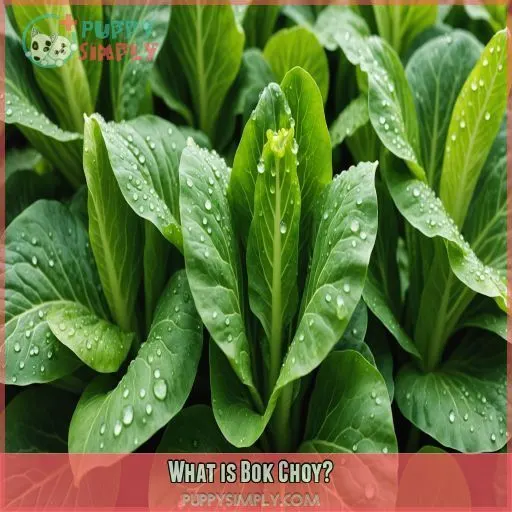This site is supported by our readers. We may earn a commission, at no cost to you, if you purchase through links.
 You’re wondering if your furry friend can munch on bok choy? The answer is yes, dogs can eat bok choy – in moderation, of course!
You’re wondering if your furry friend can munch on bok choy? The answer is yes, dogs can eat bok choy – in moderation, of course!
This Asian green is a nutrient-packed treat that’s low in calories, making it a great addition to your pup’s diet.
Rich in vitamins A, C, and K, as well as fiber and antioxidants, bok choy can support your dog’s immune system, digestion, and overall health.
Just be sure to chop it up finely, steam or sauté it, and introduce it slowly to prevent any allergic reactions.
Ready to learn more about how to make bok choy a healthy habit for your pup?
Table Of Contents
- Key Takeaways
- What is Bok Choy?
- Benefits of Bok Choy for Dogs
- Can Dogs Eat Bok Choy?
- How to Feed Bok Choy to Your Dog
- Can Dogs Eat Baby Bok Choy?
- Can Dogs Eat Raw Bok Choy?
- Can Dogs Eat Cooked Bok Choy?
- Bok Choy for Dogs With Health Conditions
- What Vegetables Should Dogs Avoid?
- Consulting With a Veterinarian
- Frequently Asked Questions (FAQs)
- What vegetables should a dog not eat?
- Are there any leafy greens dogs can’t eat?
- Is Chinese cabbage safe for dogs?
- What leafy greens are safe for dogs?
- Is bok choy a common ingredient in dog food recipes?
- Can bok choy cause digestive issues in puppies specifically?
- How does bok choy interact with dog medications and supplements?
- Can dogs develop an allergy to bok choy over time?
- Is bok choy a suitable ingredient for homemade dog treats?
- Conclusion
Key Takeaways
- You can definitely add bok choy to your dog’s menu, but make sure to introduce it slowly and in moderation to prevent any digestive upset. Chop it up finely, steam or sauté it, and mix it with their regular food for a nutrient boost.
- Bok choy is a superfood for dogs, packed with vitamins A, C, and K, as well as fiber and antioxidants that support their immune system, digestion, and overall health. It’s like a healthy smoothie for your pup!
- While bok choy is generally safe for dogs, there are some precautions to take. Be mindful of choking hazards, allergies, and gastrointestinal upset, especially if your dog has food sensitivities or allergies. Always consult with your vet before making any changes to their diet.
- If you’re unsure about how to incorporate bok choy into your dog’s meals or have concerns about their specific health needs, consult with your veterinarian for personalized guidance. They can help you create a balanced diet that includes bok choy and other nutrient-rich foods tailored to your furry friend’s unique needs.
What is Bok Choy?
You’re probably wondering what Bok Choy is and whether it’s safe for your furry friend to munch on. Bok Choy, also known as pak choi, is a type of Chinese cabbage that’s been cultivated for over 5,000 years and is packed with vitamins, minerals, and fiber that can be beneficial for dogs.
Origin and History
You’re probably wondering what bok choy is and where it comes from. This Asian green has been cultivated for over 5,000 years, originating in southern China and spreading to Southeast Asia. Also known as pak choi, it’s a staple in many Asian cuisines. As a dog owner, you’ll be excited to learn about its potential benefits for your furry friend.
Nutritional Benefits for Dogs
You’re curious about the nutritional benefits of Bok choy for your furry friend. This Asian green is a powerhouse of vitamins, minerals, and fiber. As a dog owner, you’ll love that it’s rich in vitamins A, C, and K, and high in fiber for healthy digestion. Here are some key benefits:
- Rich in vitamins A, C, and K for overall health
- High in fiber for healthy digestion and regular bowel movements
- Good source of calcium for strong bones and teeth
- Low in calories, making it a great addition to your dog’s diet without adding extra weight
Comparison to Other Leafy Greens
If you’re thinking about adding leafy greens to your dog’s diet, you might wonder how bok choy compares to other popular choices like kale and spinach.
Bok choy falls somewhere in between kale and spinach.
While kale is denser and chewier, spinach is softer and more delicate.
Bok choy’s mild flavor and crunchy texture can be a nice change of pace for your pup.
Benefits of Bok Choy for Dogs
You’re probably wondering what makes bok choy a superfood for your furry friend. As it turns out, this Asian green is packed with vitamins, minerals, and fiber that can boost your dog’s digestive health, support their immune system, and even provide antioxidant properties to keep them looking and feeling their best.
Vitamins and Minerals
Now that you know what Bok Choy is, let’s get to the good stuff – its amazing vitamins and minerals! Your furry friend will thank you for the boost to their immune system, bone health, and vision. Here are just a few of the awesome benefits:
- Rich in Vitamin A: great for healthy skin, coat, and eyes
- Packed with Vitamin C: supports immune function and collagen production
- Good source of calcium: essential for strong bones and teeth
- High in potassium: helps maintain healthy blood pressure and heart function
Fiber and Digestive Health
Bok choy is a fiber powerhouse, and that’s fantastic news for your dog’s digestive health! A happy gut means a happy pup, after all. The prebiotic fiber in bok choy helps maintain a balanced gut microbiome, reducing the risk of upset stomachs. Just be mindful of your dog’s individual needs and dietary restrictions when introducing this veggie.
Antioxidant Properties
You want the best for your furry friend, and that includes protecting them from harm. Bok choy’s antioxidant properties help shield your dog from free radical damage, supporting their immune system and promoting healthy aging. Here are four ways bok choy’s antioxidants benefit your dog:
- Neutralize free radicals: Prevent cell damage and reduce inflammation.
- Boost vitamin A levels: Support healthy vision, skin, and coat.
- Enhance immune function: Help your dog fight off infections and diseases.
- Promote overall well-being: Support your dog’s energy, vitality, and quality of life.
Can Dogs Eat Bok Choy?
You’re probably wondering if it’s safe to share your favorite stir-fry ingredient with your furry friend – and the answer is, yes, dogs can eat bok choy, but with some important caveats. Before adding this Asian green to your dog’s diet, it’s important to understand the potential risks and take necessary precautions to keep them safe.
Safety Precautions
Want to give your pup a taste of bok choy? Safety is key! Choppy, choppy! Cut those leafy greens into bite-sized pieces to avoid choking. Be on the lookout for allergies and keep an eye on portion sizes to prevent tummy troubles. Cooking matters too – steam or saut to keep those nutrients in. Follow these tips to keep your furry friend happy and healthy.
| Safety Consideration | Risk | Precaution |
|---|---|---|
| Choking hazards | Leafy greens can get stuck | Chop into small pieces |
| Allergies | Monitor for signs of allergy | Start with small portions |
| Size limits | Don’t overfeed | Follow portion guidelines |
| Stomach upset | Cooking methods can help | Steam or saut bok choy |
Potential Risks and Allergic Reactions
When feeding your dog bok choy, be aware of potential risks.
Long, fibrous leaves can be a choking hazard if not cut into small pieces.
Some dogs may be allergic, and excessive feeding can lead to gastrointestinal upset.
If your dog has dietary restrictions or allergies, monitor their reaction closely.
Start with small, safe serving sizes to avoid any adverse effects.
Consultation With a Veterinarian
You might be keen to try bok choy with your pooch, but it’s always a good idea to chat with your veterinarian first.
They can give the thumbs up and offer advice on safe serving sizes, especially if your dog has dietary restrictions.
Vets know your dog’s health inside out and can suggest alternatives or vet-approved recipes to make sure their diet is balanced.
A quick consult could save you and your furry friend any tummy troubles!
How to Feed Bok Choy to Your Dog
You’re ready to give bok choy a try with your furry friend, but you’re not sure where to start.
Don’t worry, feeding bok choy to your dog is easier than you think.
With a few simple steps, you can add this nutritious veggie to their diet.
In this section, we’ll walk you through the best ways to prepare and serve bok choy to your dog, from cooking methods to serving sizes and more.
Preparation and Cooking Methods
When preparing bok choy for your dog, chop it finely to avoid choking hazards. Steaming is a safe cooking method that preserves nutrients. Cook for 2-3 minutes or until tender. Don’t overcook, as this can lead to a loss of vitamins. Always check with your vet before introducing cooked bok choy to your dog’s diet.
Serving Sizes and Frequency
When feeding your dog bok choy, remember their size matters.
A Chihuahua’s portion will differ from a Great Dane’s.
Generally, bok choy should be an occasional treat, not a meal.
Individual needs vary, so talk to your vet for specific advice on bok choy frequency and portions.
They’ll help make sure it fits with your dog’s diet, whether they’re a tiny tot or a big bro.
Adding Bok Choy to Existing Dog Food
You can absolutely add some bok choy to your dog’s dinner.
Just chop it up nice and fine, and mix it in with their regular food.
This way, they get all the nutrition without even noticing the greens.
Think of it like hiding veggies in a pasta sauce for a picky kid.
It’s a great way to boost their nutrient intake, but remember, moderation is key.
Too much of a good thing can upset their tummy.
Can Dogs Eat Baby Bok Choy?
You’re probably wondering if baby bok choy is safe for your furry friend to munch on. The good news is that baby bok choy is just as nutritious as its mature counterpart, but there are a few things to keep in mind before adding it to your dog’s diet.
Nutritional Differences
You’re probably wondering if baby bok choy is safe for your furry friend. Nutritionally, baby bok choy is similar to its adult counterpart, but with some differences:
- Higher water content, making it more hydrating for dogs.
- Softer, more palatable leaves that are easier to digest.
- Slightly lower in fiber and vitamins compared to mature bok choy.
Safety Considerations
Baby bok choy is safe for dogs, but there are a few things to keep in mind. It’s a choking hazard, especially for small dogs, so always chop it up into tiny pieces. Some dogs might be allergic, and overfeeding can cause tummy troubles.
| Choking Hazards | Allergies & Overfeeding |
|---|---|
| Chop finely | Some dogs may be allergic |
| Remove tough stems | Tummy troubles from overfeeding |
| Steam to soften | Always consult your vet |
Feeding Guidelines
If you’re thinking about giving your dog bok choy, start with small portions (about 1/4 cup) and gradually increase as needed. For puppies, wait until they’re at least six months old. Feed cooked bok choy 1-2 times a week, and adjust frequency based on your dog’s age, size, and health. Always prioritize a balanced diet.
Can Dogs Eat Raw Bok Choy?
You might be tempted to toss your pup a piece of raw bok choy, but hold up! While dogs can technically eat raw bok choy, there are some things you should know first.
Risks and Precautions
Raw bok choy can be tricky for dogs, so there are a few things to keep in mind.
- Choking hazard: Those long, fibrous leaves can get stuck in your dog’s throat if not chopped finely.
- Allergies: Some dogs may react to raw bok choy.
- Gastrointestinal upset: Too much raw bok choy can cause stomach issues.
Always consult with your vet before introducing raw bok choy to your dog’s diet.
Benefits of Raw Bok Choy
You’re considering raw bok choy for your dog. Here’s the lowdown: raw bok choy is a vitamin boost, digestive aid, and antioxidant powerhouse. However, it’s really important to introduce it safely to avoid digestive upset. Start with small amounts and monitor your dog’s reaction. A safe serving size is key to reaping the benefits of raw bok choy.
Alternatives to Raw Bok Choy
If you’re hesitant to feed your dog raw bok choy, don’t worry, there are alternatives! Consider these dog-friendly options:
- Cooked bok choy: steaming or sautéing makes it safe and palatable.
- Green beans: a low-calorie, nutrient-rich snack.
- Carrots: a crunchy, sweet treat.
- Kale: a leafy green that’s easy to digest when cooked.
Can Dogs Eat Cooked Bok Choy?
You’re considering adding cooked bok choy to your dog’s meals, but want to make sure it’s safe and healthy for them. Cooked bok choy can be a nutritious and easily digestible treat for your dog, as long as you prepare it correctly and follow some simple guidelines.
Cooking Methods and Safety
When cooking bok choy for your dog, chop it finely to prevent choking hazards. Steam or saut it for 3-5 minutes to make it tender. Keep things safe by handling and storing it properly. A safe serving size is 1/4 cup per 10 pounds of body weight. Always check with your vet for personalized advice and to rule out potential risks.
Nutrient Retention
Now that you’ve mastered cooking bok choy safely, let’s talk nutrient retention. You want to preserve those precious vitamins and minerals for your furry friend. Here are some tips to minimize nutrient loss:
- Steaming is better than boiling, as it helps retain more nutrients.
- Heat can break down some vitamins, so cook bok choy briefly.
- Raw bok choy can be a great option, but make sure it’s clean and chopped finely to avoid choking hazards.
Serving Cooked Bok Choy to Dogs
Now that you know how to retain nutrients in cooked bok choy, let’s talk serving sizes. Here’s a rough guide:
| Serving Frequency | Portion Size |
|---|---|
| Small breeds (1-2 times/week) | 1/4 cup, chopped |
| Medium breeds (2-3 times/week) | 1/2 cup, chopped |
| Large breeds (3-4 times/week) | 3/4 cup, chopped |
Watch your dog’s reactions and adjust serving sizes accordingly.
Bok Choy for Dogs With Health Conditions
If your furry friend has a food allergy, digestive issue, or nutritional deficiency, you’re probably wondering if bok choy is a safe and healthy addition to their diet. Let’s explore how bok choy can affect dogs with specific health conditions, so you can make informed decisions about what to feed your pet.
Dogs With Food Allergies
If your dog has food allergies, introducing bok choy can be a gamble. Common allergens like pollen or proteins might trigger reactions. Consult your veterinarian to identify potential triggers and develop a safe diet plan. They can recommend alternatives or guide you on how to incorporate bok choy safely. Prioritize your dog’s health and always seek professional advice.
Dogs With Digestive Issues
If your dog has digestive issues, bok choy can be a game-changer. Rich in fiber, it supports gut health and can help regulate bowel movements. Add it to their meals as a probiotic-rich treat, but start slow to avoid overwhelming their system. Also, consider pairing it with digestive enzymes to help break down the fiber and reduce food sensitivities.
Dogs With Nutritional Deficiencies
If your dog has a nutritional deficiency, bok choy can be a great addition to their diet. Rich in vitamins and minerals, it can help alleviate deficiency symptoms. However, consult with your vet before making any diet changes or adding supplements. They’ll help you determine the best way to meet your dog’s nutritional needs.
What Vegetables Should Dogs Avoid?
As you’re learning about the benefits and risks of feeding bok choy to your dog, it’s equally important to know which veggies are off-limits altogether. Some common vegetables can be toxic to dogs, so it’s key to familiarize yourself with the ones to avoid to keep your furry friend safe and healthy.
Toxic Vegetables for Dogs
You want to keep your furry friend safe, and that means knowing which veggies to avoid. Here are three toxic vegetables for dogs that you should steer clear of:
- Onions: Can cause anemia and damage to a dog’s red blood cells.
- Garlic: Similar to onions, can lead to anemia and other health issues.
- Chocolate: Contains theobromine, which can be toxic to dogs and cause vomiting, diarrhea, and even heart problems.
Vegetables to Feed in Moderation
Some veggies are safe but should be fed in moderation due to their potential to cause tummy troubles if eaten in large quantities. Here’s a handy table with some examples:
| Veggie | Why Moderation? |
|---|---|
| Broccoli | High in fiber but can cause gas |
| Spinach | Contains oxalates that can bind minerals |
| Carrots | High sugar content, feed in small amounts |
| Squash | Safe but high in calories, may cause weight gain |
Safe Alternatives to Bok Choy
Safe Alternatives. If you’re worried about bok choy, try spinach, kale, collard greens, mustard greens, or Swiss chard. These veggies are packed with nutrients and generally safe for dogs. Just remember to introduce new foods slowly and in small amounts to avoid tummy troubles. Your vet can also advise on safe portions and prep methods for these alternatives.
Consulting With a Veterinarian
You want to give your furry friend the best, right? But when it comes to food, it’s always a good idea to be cautious. Talking to your vet before giving your dog something new, like bok choy, makes sure their special dietary needs are covered and helps avoid any potential problems.
Importance of Professional Guidance
You want to give your furry friend the best, but figuring out dog diets can be ruff. Before serving bok choy, get your vet’s approval. Here’s why:
- Makes sure the veggie meets your dog’s dietary needs
- Helps identify potential allergies or sensitivities
- Provides safe serving guidelines
- Guarantees food safety
- Gives you peace of mind, knowing you’re making informed choices for your pup.
Creating a Balanced Diet With Bok Choy
You’re ready to add Bok choy to your dog’s diet, but how? Consult with your vet to create a balanced meal plan. They’ll help you determine the right amount and frequency to reap the benefits of Bok choy while avoiding digestive upset.
| Bok Choy Benefits | Dog Food Recipes |
|---|---|
| Rich in vitamins A, C, K | Add cooked Bok choy to kibble |
| High in fiber | Mix with sweet potatoes and carrots |
| Antioxidant properties | Combine with green beans and apples |
| Supports healthy digestion | Use as a topper for raw food |
| May reduce inflammation | Blend with pumpkin and chicken broth |
Frequently Asked Questions (FAQs)
What vegetables should a dog not eat?
An ounce of prevention is worth a pound of cure." When it comes to feeding your dog veggies, avoid giving them onions, garlic, chives, mushrooms, and rhubarb, as they can be toxic and cause serious health issues.
Are there any leafy greens dogs can’t eat?
If you’re thinking about feeding your furry friend leafy greens, there are some you need to avoid. Rhubarb, for example, is toxic to dogs, while others like kale and spinach can cause stomach upset if fed excessively.
Is Chinese cabbage safe for dogs?
Hark back to ancient Chinese wisdom! If you’re wondering whether Chinese cabbage is safe for dogs, the answer is yes – in moderation. Finely chop it, cook it, and add it to their meals as an occasional treat.
What leafy greens are safe for dogs?
You want to add some green goodness to your pup’s plate? Try leafy greens like kale, spinach, or collard greens, but always check with your vet first to make sure they’re safe and beneficial for your furry friend.
Is bok choy a common ingredient in dog food recipes?
You’re probably wondering if bok choy is a staple in dog food recipes. Honestly, it’s not a typical ingredient, but its nutritional benefits make it a great occasional addition to your furry friend’s meals.
Can bok choy cause digestive issues in puppies specifically?
If you’re introducing bok choy to your puppy‘s diet, be cautious – their sensitive tummies mightn’t handle it well. Start with tiny amounts and monitor for digestive issues, like diarrhea or vomiting, and adjust accordingly.
How does bok choy interact with dog medications and supplements?
Carefully consider your canine companion’s medications and supplements before serving bok choy. Certain compounds in this Asian green may interact with blood thinners, diabetes meds, or thyroid supplements, so consult your vet for personalized guidance.
Can dogs develop an allergy to bok choy over time?
While it’s unlikely, your dog can develop an allergy to bok choy over time. Keep an eye out for signs like itching, hives, or digestive issues, and consult your vet if you notice any unusual reactions.
Is bok choy a suitable ingredient for homemade dog treats?
Are you thinking of getting creative in the kitchen for your furry friend? Bok choy can be a great addition to homemade dog treats, but be sure to finely chop and cook it first to avoid any choking hazards.
Conclusion
Fresh food fanatics, rejoice! You’ve now got the scoop on whether dogs can eat bok choy.
This nutrient-packed Asian green is a great addition to your pup’s diet, supporting their immune system, digestion, and overall health.
Just remember to introduce it slowly, chop it finely, and cook it with care.
By following these guidelines, you can make bok choy a healthy habit for your furry friend.
Happy cooking, and bon appétit for your pup!














